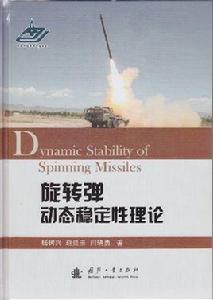出版信息
書名:旋轉彈動態穩定性理論
書號:978-7-118-09310-0
作者:楊樹興、趙良玉、閆曉勇
出版時間:2014年10月
譯者:
版次:1版1次
開本:16
裝幀:精裝
出版基金:國防科技圖書出版基金
頁數:194
字數:238
中圖分類:TJ4
叢書名:
定價:88.00
內容簡介
本書內容共分5章:第1章介紹了目前世界上幾種典型的旋轉彈以及彈體旋轉引起的空氣動力學、飛行力學、制導控制特殊性及旋轉彈動態穩定性的研究歷史;第2章定義了本書用到的幾種坐標系並給出了不同坐標系之間的轉換方法,分別建立了基於章動角和進動角及基於歐拉角描述的旋轉彈短周期運動動力學模型;
第3章基於章動角和進動角描述的彈體短周期運動動力學模型,分析了陀螺效應引起的圓運動、馬格努斯效應及彈體阻尼對彈體穩定性的影響以及彈道彎曲時的進動偏心、低速旋轉彈的極限環運動等問題;第4章針對控制交聯作用引起的錐形運動問題,分析了旋轉彈引入阻尼補償、姿態駕駛儀、過載駕駛儀、三迴路駕駛儀等多種控制系統的穩定性,推導給出了旋轉彈控制系統設計時需要遵循的穩定性準則;第5章介紹了穩態補償解耦、多變數頻率域動態補償解耦和基於神經網路的動態逆解耦等抑制錐形運動的解耦控制策略,並給出了解耦控制器的設計方法。 本書適合於從事制導武器相關工作的研究人員和科技工作者閱讀,也可作為飛行器設計、飛行器制導與控制、控制理論與工程等專業研究生和高年級本科生的參考書。
目錄
第1章緒論1
1.1典型的旋轉彈2
1.2旋轉彈的氣動特性9
1.3旋轉彈的飛行動力學特性12
1.4旋轉彈的操縱特性15
1.5旋轉彈動態穩定性的研究簡史19
參考文獻27
第2章旋轉彈運動方程組32
2.1坐標系32
2.1.1坐標系的定義32
2.1.2坐標系之間的轉換34
2.1.3歐拉角之間的幾何關係41
2.2基於歐拉角描述的彈體運動方程組43
2.2.1作用在飛彈上的力43
2.2.2作用在飛彈上的力矩45
2.2.3彈體的質心運動動力學方程48
2.2.4飛彈繞質心轉動的動力學方程50
2.2.5質心運動的運動學方程51
2.2.6彈體姿態的運動學方程52
2.3旋轉彈的短周期動力學模型53
2.3.1基於歐拉角描述的短周期動力學模型53
2.3.2基於章動角描述的短周期動力學模型54
2.3.3短周期動力學模型的變換61
參考文獻64
第3章無控旋轉彈的動態穩定性65
3.1陀螺效應引起的圓運動65
3.1.1陀螺效應65
3.1.2角速率擾動情況下陀螺效應引起的圓運動66
3.1.3任意初始擾動情況下陀螺效應引起的圓運動69
3.2馬格努斯效應及彈體阻尼對彈體穩定性的影響71
3.3彈道彎曲時的進動偏心73
3.4周期擾動引起的圓運動76
3.4.1周期擾動引起的三圓運動77
3.4.2誘導側向力矩77
3.4.3誘導滾轉力矩及轉速閉鎖發生條件78
3.5低速旋轉彈的極限環運動81
3.5.1臨界轉速導致的穩定流形82
3.5.2氣動非線性造成的極限環運動86
參考文獻90
第4章有控旋轉彈的動態穩定性91
4.1彈體運動方程組的簡化91
4.2旋轉條件下執行機構的動力學模型93
4.2.1舵機的動力學模型93
4.2.2旋轉彈執行機構的動態回響95
4.3帶有阻尼迴路的旋轉彈控制系統穩定性100
4.3.1穩定性條件及分析101
4.3.2案例分析103
4.4姿態駕駛儀的穩定性106
4.4.1穩定性條件及分析107
4.4.2案例分析110
4.5過載駕駛儀的穩定性111
4.5.1控制指令生成112
4.5.2過載駕駛儀系統方程112
4.5.3穩定性條件及分析114
4.5.4過載駕駛儀設計的一般方法119
4.5.5案例分析120
4.6三迴路駕駛儀的穩定性122
4.6.1三迴路駕駛儀穩定條件123
4.6.2穩定性條件分析126
4.6.3案例分析129
參考文獻132
第5章旋轉彈的解耦控制133
5.1通道耦合特性133
5.2指令補償解耦134
5.2.1控制交聯補償134
5.2.2彈體動力學補償134
5.2.3仿真結果分析137
5.3動態對角陣優勢解耦139
5.3.1奈氏陣列穩定性判據139
5.3.2對角優勢理論140
5.3.3解耦補償器設計141
5.4神經網路動態逆解耦147
5.4.1逆控制方法基本原理147
5.4.2神經網路逆控制方法151
5.4.3旋轉彈的動態逆控制器設計152
5.4.4動態逆控制系統性能分析160
參考文獻170
附錄A線性定常系統的穩定性判據171
附錄B復係數方程的穩定性判據173
附錄C非線性系統的相平面分析方法176
附錄D矢量運算法則179
附錄E格西高林定理181
附錄F錐形運動穩定性分析的MATLAB程式182
主要符號表186
索引189
Contents
Chapter 1Introduction1
1.1Typical Spinning Missiles and Projectiles
2
1.2Aerodynamic Characteristics of Spinning Missiles
9
1.3Flight Dynamics of Spinning Missiles12
1.4Control Characteristics of Spinning Missiles15
1.5Brief Research History on Dynamic Stability of Spinning Missiles19
References27
Chapter 2Motion Equations of Spinning Missiles32
2.1Coordinate Systems32
2.1.1Definition of Coordinate Systems32
2.1.2Coordinates Transformation34
2.1.3Geometric Relationship between the Euler Angles41
2.2Motion Equations of Spinning Missiles by Euler Angles43
2.2.1Forces Acting on the Missile43
2.2.2Moments Acting on the Missile45
2.2.3Kinetics of Translation of the Center of Mass48
2.2.4Kinetics of Rotation Around the Center of Mass50
2.2.5Translational Equations of the Center of Mass51
2.2.6Attitude Equations of the Missile52
2.3Short-Period Dynamics Model of Spinning Missiles53
2.3.1Short-Period Dynamics Model by Euler Angles〖53
2.3.2Short-Period Dynamics Model by Precession Angles54
2.3.3Transformation of Short-Period Dynamics Models61
References64
Chapter 3Dynamic Stability of Free-Flight Spinning Missiles65
3.1Circular Motion Induced by Gyroscopic Effects65
3.1.1Gyroscopic Effects65
3.1.2Circular Motion under Disturbance of Angular Rate66
3.1.3Circular Motion underArbitrary Initial Disturbance69
3.2Influence on Stability of Magnus Effect and Damping Effect71
3.3Precession Eccentricity under Curved Trajectory73
3.4Circular Motion Induced by Periodic Pertubation76
3.4.1Three Mode Circular Motion under Periodic Pertubation77
3.4.2Induced Side Moment77
3.4.3Induced Roll Moment and Conditions of Roll Lock-in78
3.5Limit Cycle of Spinning Missiles at Low Rolling Rate81
3.5.1Stable Manifold at Critical Rolling Rate82
3.5.2Limit Cycle Induced by Nonlinear Aerodynamic Moment86
References90
Chapter 4Dynamic Stability of Controlled Spinning Missiles91
4.1Simplification of the Equations of Motion91
4.2Dynamics Model of the Actuator under Rolling93
4.2.1Dynamics Model of the Actuator93
4.2.2Dynamic Response of the Actuator under Rolling95
4.3Stability of Spinning Missiles with Rate Loop100
4.3.1Stability Conditions and Analysis101
4.3.2Case Study103
4.4Stability of Spinning Missiles with Attitude Autopilot106
4.4.1Stability Conditions and Analysis107
4.4.2Case Study110
4.5Stability of Spinning Missiles with Acceleration Autopilot111
4.5.1Control Commands112
4.5.2Motion Equations of Acceleration Autopilot112
4.5.3Stability Conditions and Analysis114
4.5.4Design Method of the Acceleration Autopilot119
4.5.5Case Study120
4.6Stability of Spinning Missiles with Three Loop Autopilot122
4.6.1Stability Conditions of Three Loop Autopilot123
4.6.2Analysis of the Stability Conditions126
4.6.3Case Study129
References132
Chapter 5Decoupling Control of Spinning Missiles133
5.1Coupling Effects of Pitch and Yaw133
5.2Decoupling Control by Command Compensation134
5.2.1Compensation of Control Crosscoupling134
5.2.2Compensation of Kinetics of Missile Airframe134
5.2.3Analysis of Simulation Results137
5.3Decoupling Control Based on Dynamic Diagonal Dominancy139
5.3.1Stability Criterion of the Nyquist Array139
5.3.2Theory of Dynamic Diagonal Dominancy140
5.3.3Design of Decoupling Compensator141
5.4Decoupling Control by Dynamic Inversion with Neural Network147
5.4.1Principles of Inverse Control147
5.4.2Inverse Control with Neural Network151
5.4.3Dynamic Inversion Controller Design of Spinning Missiles152
5.4.4Performance Analysis of the Dynamic Inversion Controller160
References170
Appendixes AStability Criterion of Linear Time-Invariant Systems171
Appendixes BStability Criterion of Polynomials with Complex Coefficients173
Appendixes CPhase Plane Analysis Method of Nonlinear Systems176
Appendixes DVector Algorithm179
Appendixes EGershgorin Theorem181
Appendixes FMATLAB Code of Stability Analysis of Coning Motion182
Nomenclature186
Index189"

